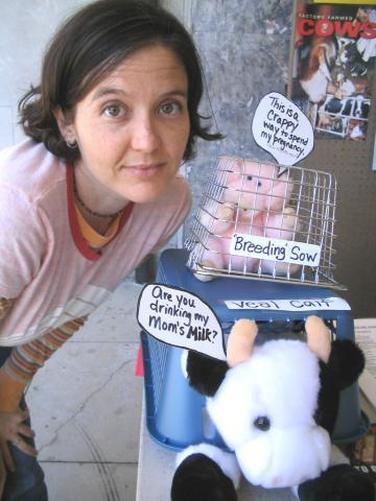|
WHAT IS THE BOOK ABOUT?
Framing Farming: Communication Strategies for Animal Rights questions the extent to which animal rights activists should promote animal rights ideals when attempting to persuade people to stop eating animals. Contributing to a classic social movement framing debate, Professor Freeman examines the animal rights movement’s struggles over whether to construct farmed animal campaign messages based more on utility (emphasizing animal welfare, anti-cruelty farming reforms, dietary reduction of animal foods, and human self-interest like health) or based more on ideology (emphasizing animal rights and abolition of farming and eating fellow animals). Freeman prioritizes the latter, “ideological authenticity,” to promote a needed transformation in worldviews and human-animal identity, not just behaviors. This would mean framing “Go Veg” messages not only around compassion, but also around principles of ecology, liberty, and justice, convincing people that “it’s not fair to farm anyone" (in factory farms or on any farms). Through a unique frame analysis of vegan campaign materials (from websites, to videos, to bumper stickers) at five prominent U.S. animal rights organizations, and interviews (in 2008 and 2012) with their leaders, Freeman answers questions, such as:
Appealing to both scholars and activists, Framing Farming distinctively offers practical strategic guidance while remaining grounded in animal ethics and communication theory. It not only describes what 21st century animal rights campaigns are communicating, it also prescribes recommendations for what they should communicate to remain culturally resonant while promoting needed long-term social transformation away from using animals as resources. Dr. Freeman's recommendations revolve around: Framing an animal-based diet as a problem because it is:
Activists should engage the public as both consumers and citizens to explain everyone's culpability and capability toward individual and collective solutions, primarily:
WHAT IS MEANT BY "FRAMING"?
Framing is a natural communication technique (operating within a larger discourse) used to package or organize messages in ways that make them more meaningful and understandable for intended audiences. Frames draw attention to certain aspects over others, define problems, and guide interpretations and actions. Todd Gitlin (2003) describes frames as helping to define "what matters" (p. 6). Studying frames helps you observe ideology at work (Snow & Benford, 2005). |
Link here to PDF document that provides an overview of:
|
